Hosea 1 meaning explained in AI Summary
This chapter sets the stage for the entire book of Hosea, using a shocking metaphor to illustrate God's relationship with Israel.
God's Command to Hosea (1:2-3): God instructs the prophet Hosea to marry a woman named Gomer, who will be unfaithful to him. This seemingly strange command is symbolic of Israel's unfaithfulness to God.
Hosea's Children and Their Symbolic Names (1:4-9): Hosea and Gomer have three children, each given a name that carries a prophetic message about Israel's future:
- Jezreel: Meaning "God scatters" or "God sows," this name foreshadows the scattering of Israel due to their sins, particularly the bloodshed at Jezreel under the house of Ahab.
- Lo-Ruhamah: Meaning "not pitied" or "not loved," this name signifies God's withdrawal of his love and compassion from Israel because of their idolatry.
- Lo-Ammi: Meaning "not my people," this name represents the breaking of the covenant between God and Israel due to their unfaithfulness.
A Glimmer of Hope (1:10-11): Despite the bleak pronouncements, the chapter ends with a glimmer of hope. God promises that although Israel will face judgment and exile, they will eventually be restored and reunited as his people. This restoration will be even greater than before, with a multitude of descendants and a renewed covenant with God.
Key Themes:
- Israel's Unfaithfulness: The chapter highlights Israel's spiritual adultery through their worship of other gods, drawing a parallel with Gomer's unfaithfulness.
- God's Love and Judgment: Despite his love for Israel, God cannot tolerate their idolatry and will bring judgment upon them.
- Hope for Restoration: Even in judgment, God offers hope for future restoration and reconciliation with his people.
Overall, Chapter 1 of Hosea serves as a powerful introduction to the book's central themes of sin, judgment, and ultimately, God's enduring love and faithfulness.
Hosea 1 bible study ai commentary
Hosea 1 details the tragic and prophetic marriage of Hosea to an unfaithful wife, Gomer. This union serves as a powerful living parable of God's covenant relationship with Israel. The names of their three children—Jezreel, Lo-Ruhamah, and Lo-Ammi—symbolize the escalating stages of God's judgment upon the spiritually adulterous northern kingdom. However, the chapter abruptly concludes with a stunning promise of future restoration, where the rejected will be reclaimed as children of the living God, foreshadowing the inclusion of all believers into God's family.
Hosea 1 Context
The prophecy of Hosea is set in the turbulent 8th century BC, during the final decades of the Northern Kingdom of Israel. While experiencing a period of material prosperity under King Jeroboam II, the nation was plagued by deep spiritual and moral corruption. The primary religious sin was syncretism—the blending of Yahweh worship with the worship of Baal, the Canaanite god of fertility and storm. The people attributed their agricultural bounty and children to Baal, effectively committing spiritual adultery against the LORD, their true provider and covenant husband. This chapter directly confronts this apostasy, using the intimate and painful imagery of marriage and family to depict Israel's unfaithfulness and God's impending judgment at the hands of the rising Assyrian empire.
Hosea 1:1
The word of the Lord that came to Hosea, the son of Beeri, in the days of Uzziah, Jotham, Ahaz, and Hezekiah, kings of Judah, and in the days of Jeroboam the son of Joash, king of Israel.
In-depth-analysis
- "The word of the Lord...": This standard prophetic formula establishes divine authority. The message is not Hosea's opinion but a direct revelation from God.
- Hosea: His name (Hoshea), meaning "salvation," is poignantly ironic given his message of judgment. It is the root name of both Joshua and Jesus (Yeshua).
- List of Kings: This lengthy list places Hosea's ministry over a long and tumultuous period, from the height of Israel's power under Jeroboam II to its collapse. Listing Judah's kings first may suggest a Judean perspective in the final compilation of the book or a recognition of the Davidic line as the legitimate one.
- Jeroboam II: His reign was Israel's last period of significant strength before its swift decline and conquest by Assyria, which happened shortly after his death. Hosea's prophecy begins at the peak of Israel's complacency.
Bible references
- 2 Kings 14:23-29: 'In the fifteenth year of Amaziah... Jeroboam the son of Joash, king of Israel, began to reign... and he restored the border of Israel.' (Historical background for Jeroboam II's reign).
- Amos 1:1: 'The words of Amos... which he saw concerning Israel in the days of Uzziah king of Judah and in the days of Jeroboam son of Joash, king of Israel.' (Places Amos as a contemporary prophet delivering a similar message).
- Isaiah 1:1: 'The vision of Isaiah... which he saw concerning Judah and Jerusalem in the days of Uzziah, Jotham, Ahaz, and Hezekiah, kings of Judah.' (Places Isaiah as another contemporary, focusing primarily on Judah).
Cross references
2 Tim 3:16 (word of God), 2 Pet 1:21 (prophecy from God), 2 Kgs 15 (historical backdrop).
Hosea 1:2
When the Lord first spoke through Hosea, the Lord said to Hosea, “Go, take to yourself a wife of whoredom and have children of whoredom, for the land commits great whoredom by forsaking the Lord.”
In-depth-analysis
- "Go, take...": An imperative command that demands a radical life-action. Hosea's own life and family are to become the sermon. This is a dramatized prophecy.
- Wife of whoredom: The Hebrew
eshet zenunimis debated. It could mean she was already a prostitute, or a woman with a disposition toward unfaithfulness, or simply an ordinary woman from a society completely steeped in "whoredom" (idolatry). The shock value is the same. The focus is on the symbolic representation of Israel. - Children of whoredom: The children born into this union will also represent the adulterous nation they are part of. Their very existence is a sign of Israel's spiritual illegitimacy.
- "For the land commits great whoredom": This is the divine rationale. Hosea’s personal life is a mirror of the national spiritual reality. "Whoredom" (zenunim) is the primary metaphor in Hosea for idolatry—breaking the exclusive marriage-like covenant with Yahweh to worship other gods, particularly Baal.
Bible references
- Ezekiel 16:15: 'But you trusted in your own beauty and played the harlot because of your renown...' (A similar extended metaphor of Jerusalem as an unfaithful wife).
- Jeremiah 3:1: 'If a man divorces his wife... and she goes from him and becomes another man's... would he return to her? ... But you have played the harlot with many lovers.' (Uses the same adultery/harlotry theme for Israel's idolatry).
- James 4:4: 'You adulterous people! Do you not know that friendship with the world is enmity with God?' (The New Testament applies the adultery metaphor to worldliness).
Cross references
Ex 34:15-16 (warning against spiritual harlotry), Deut 31:16 (prophecy of Israel's future whoring), Isa 20:2-3 (prophet's symbolic action), Jer 13:1-7 (prophet's symbolic action).
Polemics
The polemic here is a direct assault on Baalism. The Israelites worshiped Baal for fertility of land and womb. God commands Hosea to take a wife whose core identity is linked to sexual unfaithfulness ("whoredom"), which was a feature of some Canaanite religious rites. God demonstrates that He, not Baal, is the husband to whom Israel owes faithfulness and the ultimate source of life and children.
Hosea 1:3
So he went and took Gomer, the daughter of Diblaim, and she conceived and bore him a son.
In-depth-analysis
- "So he went and took": Hosea’s immediate and unquestioning obedience underscores the divine authority of the command, no matter how personally painful or socially shameful. His obedience makes the prophecy real.
- Gomer: Her name can mean "completion." She serves as the complete embodiment of Israel's sin. Her story, a cycle of unfaithfulness and redemption (see chap 3), is a microcosm of Israel's story.
- Daughter of Diblaim: "Diblaim" may mean "two fig cakes," which were sometimes used in pagan rituals or seen as a delicacy/aphrodisiac, possibly hinting at the sensual, idolatrous culture she came from.
Bible references
- Genesis 22:3: 'So Abraham rose early in the morning... and went to the place of which God had told him.' (A parallel of profound, difficult obedience).
- Luke 5:27-28: '[Jesus] said to him, "Follow me." And leaving everything, he rose and followed him.' (A disciple's immediate obedience to a life-altering call).
Cross references
Acts 26:19 (Paul's obedience to heavenly vision), Matt 16:24 (cost of discipleship).
Hosea 1:4-5
And the Lord said to him, “Call his name Jezreel, for in just a little while I will punish the house of Jehu for the blood of Jezreel, and I will put an end to the kingdom of the house of Israel. And on that day I will break the bow of Israel in the Valley of Jezreel.”
In-depth-analysis
- Jezreel: The name has a dual meaning. Literally "God Sows." Here, it means God will scatter and sow judgment. The name is a direct historical reference.
- "The blood of Jezreel": Refers to the massacre Jehu carried out against the house of Ahab in the Valley of Jezreel (2 Kings 9-10). Although initially sanctioned by God to end Ahab's idolatry, Jehu's actions were driven by personal ambition and brutality, and his dynasty did not turn back to true worship of Yahweh. God now calls his descendants to account.
- "Put an end to the kingdom": A direct prophecy of the downfall of the Northern Kingdom of Israel.
- "Break the bow of Israel": A "bow" is a symbol of military power. This prophesies a decisive military defeat. The location is specified: the Valley of Jezreel, a large, fertile plain that was a major battleground. This was fulfilled when the Assyrians conquered Israel around 722 BC.
Bible references
- 2 Kings 10:11: 'So Jehu struck down all who remained of the house of Ahab in Jezreel... until he left him none remaining.' (The original event being judged).
- 2 Kings 15:10, 12: 'Shallum... struck him down... and killed him... This was the word of the Lord that he spoke to Jehu, "Your sons shall sit on the throne of Israel to the fourth generation." And so it came to pass.' (The fulfillment of the end of Jehu's dynasty, as Hosea prophesied).
- Amos 1:5: 'I will break the bar of Damascus...' (Similar language of breaking a nation's strength).
Cross references
1 Kgs 21:19 (Elijah's curse on Ahab in Jezreel), Jer 49:35 (breaking the bow of Elam).
Hosea 1:6-7
She conceived again and bore a daughter. And the Lord said to him, “Call her name No Mercy, for I will no more have mercy on the house of Israel, to forgive them at all. But I will have mercy on the house of Judah, and I will save them by the Lord their God. I will not save them by bow or by sword or by war or by horses or by horsemen.”
In-depth-analysis
- No Mercy: Hebrew
Lo-Ruhamah. Ruhamah is a deep, motherly, covenantal compassion. God is withdrawing this specific pity from the Northern Kingdom. The judgment is escalating from political overthrow (Jezreel) to the removal of divine compassion. - Contrast with Judah (v. 7): God makes a clear distinction. While Israel (the Northern Kingdom) faces unforgiving judgment, Judah (the Southern Kingdom) will be shown mercy.
- "Save them by the Lord their God": The deliverance of Judah will not be by conventional military might. This points to a supernatural salvation, famously fulfilled when God delivered Jerusalem from the Assyrian army of Sennacherib without a fight (2 Kings 19, Isaiah 37).
Bible references
- Exodus 34:6-7: 'The Lord, the Lord, a God merciful and gracious... abounding in steadfast love and faithfulness...' (Describes the very character God is withdrawing from Israel).
- 2 Kings 19:35: 'And that night the angel of the Lord went out and struck down 185,000 in the camp of the Assyrians.' (The fulfillment of God saving Judah supernaturally).
- Zechariah 4:6: 'Not by might, nor by power, but by my Spirit, says the Lord of hosts.' (The principle of divine salvation over human strength).
Cross references
Isa 37:36 (the account of Sennacherib's defeat), Ps 33:16-17 (kings not saved by armies).
Hosea 1:8-9
When she had weaned No Mercy, she conceived and bore a son. And the Lord said, “Call his name Not My People, for you are not my people, and I am not your God.”
In-depth-analysis
- "When she had weaned...": This detail suggests a time gap, perhaps indicating God's patience before delivering the final word of judgment.
- Not My People: Hebrew
Lo-Ammi. This is the ultimate, climactic pronouncement of judgment. It is the formal language of divorce, a complete severing of the covenant relationship. - "You are not my people, and I am not your God": This is a direct and horrifying reversal of the central covenant formula God established with Israel. The relationship is declared null and void. The judgment has now moved from political destruction (Jezreel) and loss of mercy (Lo-Ruhamah) to a total loss of identity and relationship (Lo-Ammi).
Bible references
- Exodus 6:7: 'I will take you to be my people, and I will be your God...' (The foundational covenant promise that is being explicitly revoked).
- Deuteronomy 32:21: 'They have made me jealous with what is no god... so I will make them jealous with those who are no people...' (A foreshadowing from the Law of this very type of judgment).
- Jeremiah 31:33: '...and I will be their God, and they shall be my people.' (The New Covenant promise explicitly restores what is broken here).
Cross references
Lev 26:12 (original covenant promise), Deut 29:22-28 (covenant curses for disobedience).
Hosea 1:10-11
Yet the number of the children of Israel shall be like the sand of the sea, which cannot be measured or numbered. And in the place where it was said to them, “You are not my people,” it shall be said to them, “Children of the living God.” And the children of Judah and the children of Israel shall be gathered together, and they shall appoint for themselves one head. And they shall go up from the land, for great shall be the day of Jezreel.
In-depth-analysis
- "Yet...": A sudden, dramatic, and grace-filled turn from absolute judgment to astonishing hope.
- "Like the sand of the sea": A direct echo of the Abrahamic Covenant, signaling that despite the breaking of the Mosaic Covenant, God's foundational promises to Abraham remain.
- "Children of the living God": The condemnation of
Lo-Ammi("Not My People") is completely reversed and elevated to "Sons of the living God." This points beyond mere national restoration to intimate adoption. - "Gathered together... one head": This prophesies the future reunification of the divided kingdoms of Israel and Judah under one leader, a clear Messianic prophecy.
- "Great shall be the day of Jezreel": The meaning of Jezreel is now reclaimed. What was a place and symbol of scattering ("God Sows" judgment) will become the place of a great harvest ("God Sows" blessing and restoration).
Bible references
- Romans 9:25-26: 'As he says also in Hosea, "Those who were not my people I will call ‘my people,’"... And in the very place where it was said to them, "You are not my people," there they will be called "sons of the living God."' (The Apostle Paul explicitly quotes this passage and applies its fulfillment to the inclusion of the Gentiles into the church).
- 1 Peter 2:10: 'Once you were not a people, but now you are God’s people; once you had not received mercy, but now you have received mercy.' (The Apostle Peter directly quotes the themes of
Lo-AmmiandLo-Ruhamahand applies them to believers, both Jew and Gentile). - Genesis 22:17: 'I will surely bless you, and I will surely multiply your offspring as the stars of heaven and as the sand that is on the seashore.' (The Abrahamic promise being reaffirmed).
Cross references
John 1:12 (becoming children of God), Eph 2:11-13 (Gentiles brought near), Ezek 37:22-24 (prophecy of one king over a united Israel), Isa 11:12-13 (re-gathering of Israel and Judah).
Hosea chapter 1 analysis
- The Living Parable: The power of Hosea 1 is that the prophet's life is the message. His personal suffering, shame, and obedience become a walking, breathing embodiment of God's own covenant anguish over His people's betrayal.
- Escalating Judgment: The names of the children form a terrifying progression. It begins with political judgment (Jezreel), moves to the emotional/relational withdrawal of covenant mercy (Lo-Ruhamah), and culminates in the complete legal and spiritual separation of identity (Lo-Ammi).
- Sovereignty in Judgment and Grace: God is sovereign over history, promising to "break the bow of Israel" in Jezreel, a prophecy fulfilled by Assyria. Just as sovereignly, and with no human prompting, He declares a future restoration that seems impossible, reversing the very curses He has just pronounced.
- The Gospel Reversal: The shocking turn in verse 10 is pure gospel. The ultimate end of God's plan is not condemnation but adoption. The application of these verses in Romans 9 and 1 Peter 2 is one of the clearest Old Testament proofs that God's redemptive plan always intended to include a "people who were not his people"—the Gentiles—and form one new family in Christ.
Hosea 1 summary
God commands Hosea to marry an unfaithful woman, Gomer, as a living symbol of Israel's spiritual adultery. Their three children are given names of judgment: Jezreel (God will punish), Lo-Ruhamah (No Mercy), and Lo-Ammi (Not My People), signifying the dissolution of God’s covenant with Israel. The chapter ends with a stunning promise that God will one day reverse these judgments, restore His people, and call them "Children of the living God," foreshadowing the New Covenant in Christ.
Hosea 1 AI Image Audio and Video


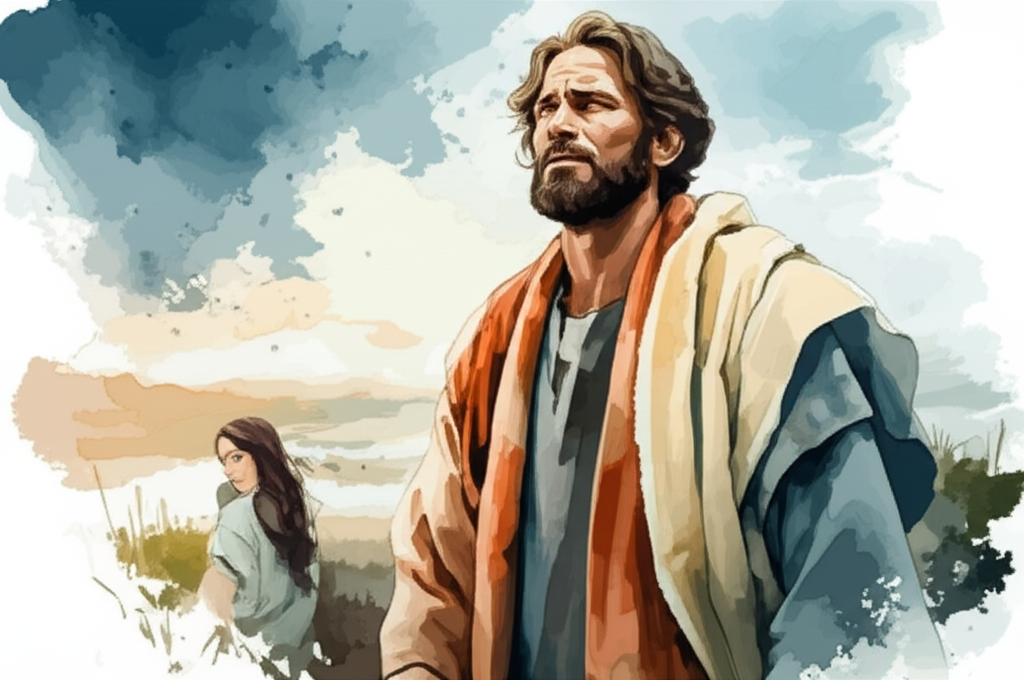

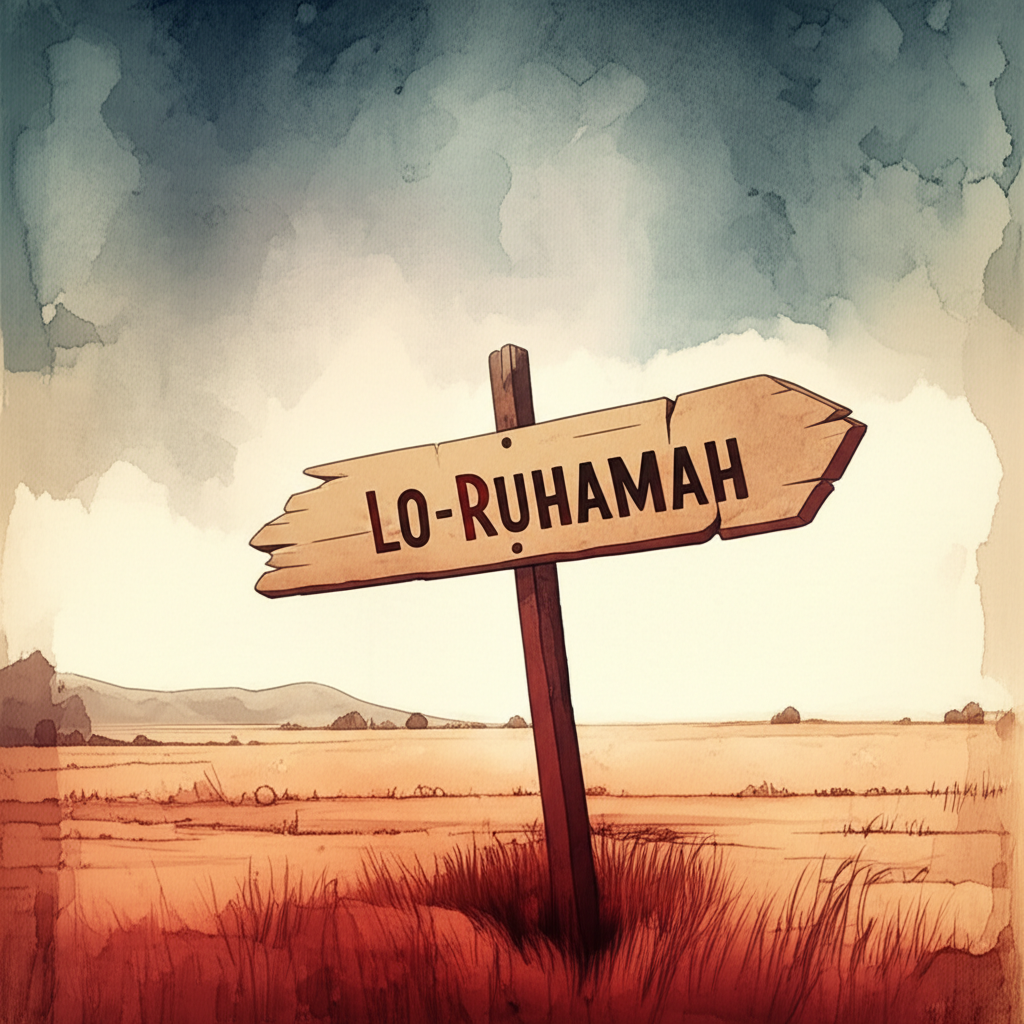
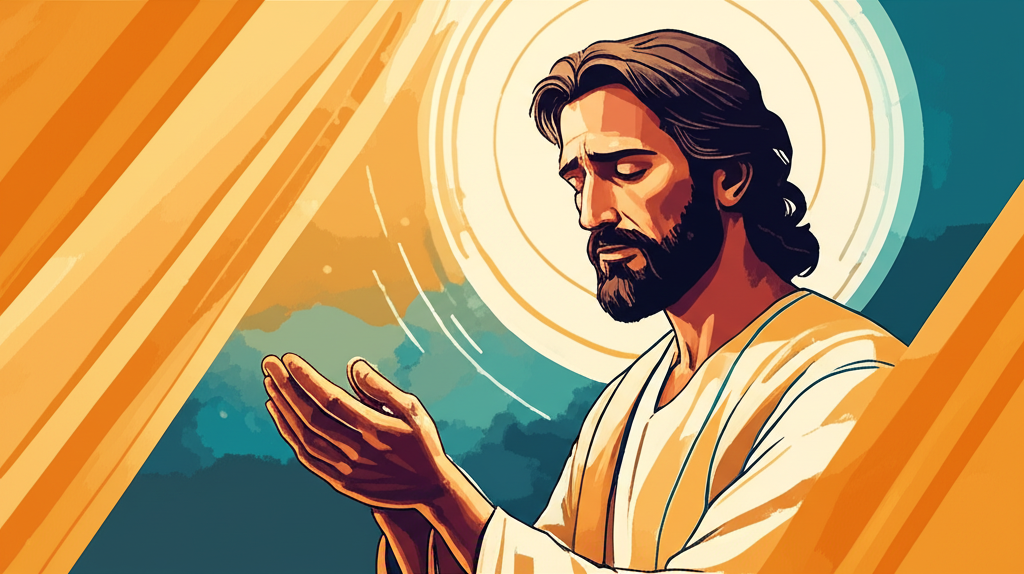
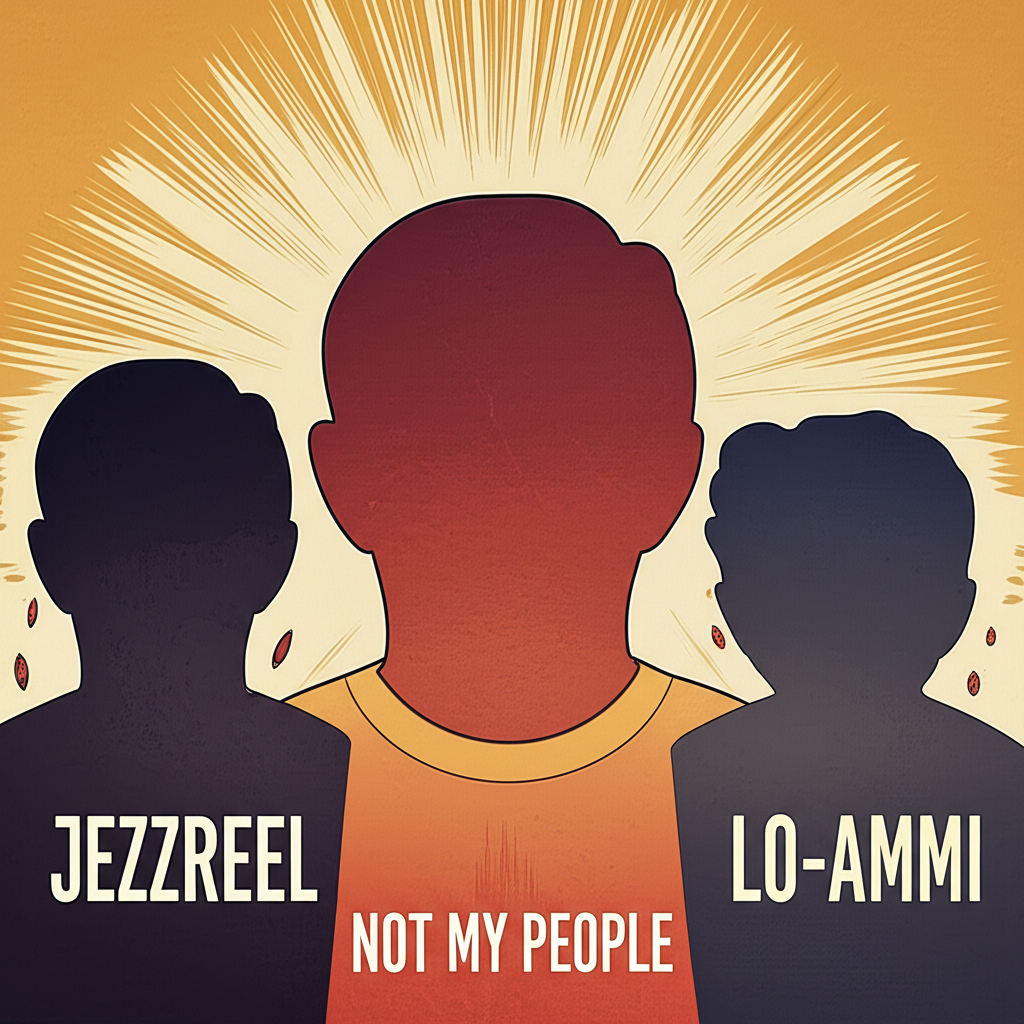
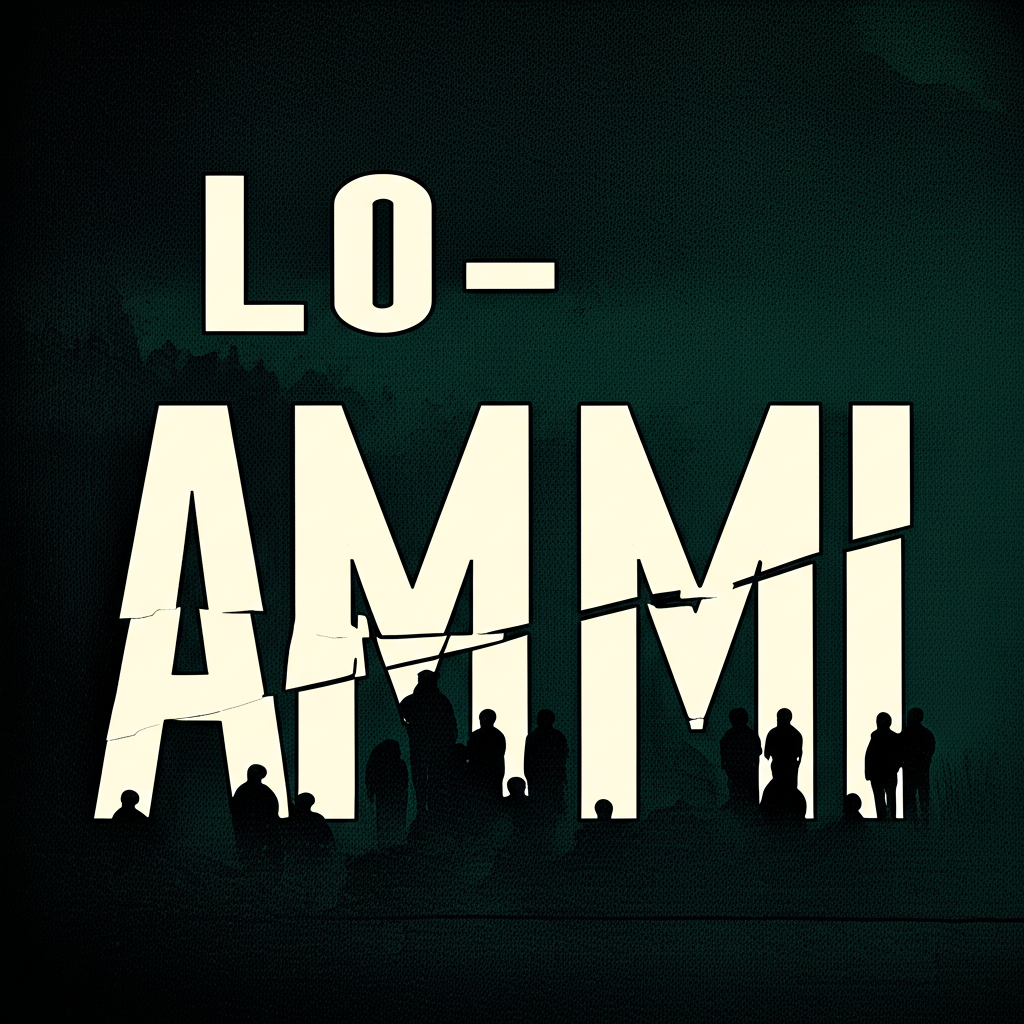



Hosea chapter 1 kjv
- 1 The word of the LORD that came unto Hosea, the son of Beeri, in the days of Uzziah, Jotham, Ahaz, and Hezekiah, kings of Judah, and in the days of Jeroboam the son of Joash, king of Israel.
- 2 The beginning of the word of the LORD by Hosea. And the LORD said to Hosea, Go, take unto thee a wife of whoredoms and children of whoredoms: for the land hath committed great whoredom, departing from the LORD.
- 3 So he went and took Gomer the daughter of Diblaim; which conceived, and bare him a son.
- 4 And the LORD said unto him, Call his name Jezreel; for yet a little while, and I will avenge the blood of Jezreel upon the house of Jehu, and will cause to cease the kingdom of the house of Israel.
- 5 And it shall come to pass at that day, that I will break the bow of Israel, in the valley of Jezreel.
- 6 And she conceived again, and bare a daughter. And God said unto him, Call her name Loruhamah: for I will no more have mercy upon the house of Israel; but I will utterly take them away.
- 7 But I will have mercy upon the house of Judah, and will save them by the LORD their God, and will not save them by bow, nor by sword, nor by battle, by horses, nor by horsemen.
- 8 Now when she had weaned Loruhamah, she conceived, and bare a son.
- 9 Then said God, Call his name Loammi: for ye are not my people, and I will not be your God.
- 10 Yet the number of the children of Israel shall be as the sand of the sea, which cannot be measured nor numbered; and it shall come to pass, that in the place where it was said unto them, Ye are not my people, there it shall be said unto them, Ye are the sons of the living God.
- 11 Then shall the children of Judah and the children of Israel be gathered together, and appoint themselves one head, and they shall come up out of the land: for great shall be the day of Jezreel.
Hosea chapter 1 nkjv
- 1 The word of the LORD that came to Hosea the son of Beeri, in the days of Uzziah, Jotham, Ahaz, and Hezekiah, kings of Judah, and in the days of Jeroboam the son of Joash, king of Israel.
- 2 When the LORD began to speak by Hosea, the LORD said to Hosea: "Go, take yourself a wife of harlotry And children of harlotry, For the land has committed great harlotry By departing from the LORD."
- 3 So he went and took Gomer the daughter of Diblaim, and she conceived and bore him a son.
- 4 Then the LORD said to him: "Call his name Jezreel, For in a little while I will avenge the bloodshed of Jezreel on the house of Jehu, And bring an end to the kingdom of the house of Israel.
- 5 It shall come to pass in that day That I will break the bow of Israel in the Valley of Jezreel."
- 6 And she conceived again and bore a daughter. Then God said to him: "Call her name Lo-Ruhamah, For I will no longer have mercy on the house of Israel, But I will utterly take them away.
- 7 Yet I will have mercy on the house of Judah, Will save them by the LORD their God, And will not save them by bow, Nor by sword or battle, By horses or horsemen."
- 8 Now when she had weaned Lo-Ruhamah, she conceived and bore a son.
- 9 Then God said: "Call his name Lo-Ammi, For you are not My people, And I will not be your God.
- 10 "Yet the number of the children of Israel Shall be as the sand of the sea, Which cannot be measured or numbered. And it shall come to pass In the place where it was said to them, 'You are not My people,' There it shall be said to them, 'You are sons of the living God.'
- 11 Then the children of Judah and the children of Israel Shall be gathered together, And appoint for themselves one head; And they shall come up out of the land, For great will be the day of Jezreel!
Hosea chapter 1 niv
- 1 The word of the LORD that came to Hosea son of Beeri during the reigns of Uzziah, Jotham, Ahaz and Hezekiah, kings of Judah, and during the reign of Jeroboam son of Jehoash king of Israel:
- 2 When the LORD began to speak through Hosea, the LORD said to him, "Go, marry a promiscuous woman and have children with her, for like an adulterous wife this land is guilty of unfaithfulness to the LORD."
- 3 So he married Gomer daughter of Diblaim, and she conceived and bore him a son.
- 4 Then the LORD said to Hosea, "Call him Jezreel, because I will soon punish the house of Jehu for the massacre at Jezreel, and I will put an end to the kingdom of Israel.
- 5 In that day I will break Israel's bow in the Valley of Jezreel."
- 6 Gomer conceived again and gave birth to a daughter. Then the LORD said to Hosea, "Call her Lo-Ruhamah (which means "not loved"), for I will no longer show love to Israel, that I should at all forgive them.
- 7 Yet I will show love to Judah; and I will save them?not by bow, sword or battle, or by horses and horsemen, but I, the LORD their God, will save them."
- 8 After she had weaned Lo-Ruhamah, Gomer had another son.
- 9 Then the LORD said, "Call him Lo-Ammi (which means "not my people"), for you are not my people, and I am not your God.
- 10 "Yet the Israelites will be like the sand on the seashore, which cannot be measured or counted. In the place where it was said to them, 'You are not my people,' they will be called 'children of the living God.'
- 11 The people of Judah and the people of Israel will come together; they will appoint one leader and will come up out of the land, for great will be the day of Jezreel.
Hosea chapter 1 esv
- 1 The word of the LORD that came to Hosea, the son of Beeri, in the days of Uzziah, Jotham, Ahaz, and Hezekiah, kings of Judah, and in the days of Jeroboam the son of Joash, king of Israel.
- 2 When the LORD first spoke through Hosea, the LORD said to Hosea, "Go, take to yourself a wife of whoredom and have children of whoredom, for the land commits great whoredom by forsaking the LORD."
- 3 So he went and took Gomer, the daughter of Diblaim, and she conceived and bore him a son.
- 4 And the LORD said to him, "Call his name Jezreel, for in just a little while I will punish the house of Jehu for the blood of Jezreel, and I will put an end to the kingdom of the house of Israel.
- 5 And on that day I will break the bow of Israel in the Valley of Jezreel."
- 6 She conceived again and bore a daughter. And the LORD said to him, "Call her name No Mercy, for I will no more have mercy on the house of Israel, to forgive them at all.
- 7 But I will have mercy on the house of Judah, and I will save them by the LORD their God. I will not save them by bow or by sword or by war or by horses or by horsemen."
- 8 When she had weaned No Mercy, she conceived and bore a son.
- 9 And the LORD said, "Call his name Not My People, for you are not my people, and I am not your God."
- 10 Yet the number of the children of Israel shall be like the sand of the sea, which cannot be measured or numbered. And in the place where it was said to them, "You are not my people," it shall be said to them, "Children of the living God."
- 11 And the children of Judah and the children of Israel shall be gathered together, and they shall appoint for themselves one head. And they shall go up from the land, for great shall be the day of Jezreel.
Hosea chapter 1 nlt
- 1 The LORD gave this message to Hosea son of Beeri during the years when Uzziah, Jotham, Ahaz, and Hezekiah were kings of Judah, and Jeroboam son of Jehoash was king of Israel.
- 2 When the LORD first began speaking to Israel through Hosea, he said to him, "Go and marry a prostitute, so that some of her children will be conceived in prostitution. This will illustrate how Israel has acted like a prostitute by turning against the LORD and worshiping other gods."
- 3 So Hosea married Gomer, the daughter of Diblaim, and she became pregnant and gave Hosea a son.
- 4 And the LORD said, "Name the child Jezreel, for I am about to punish King Jehu's dynasty to avenge the murders he committed at Jezreel. In fact, I will bring an end to Israel's independence.
- 5 I will break its military power in the Jezreel Valley."
- 6 Soon Gomer became pregnant again and gave birth to a daughter. And the LORD said to Hosea, "Name your daughter Lo-ruhamah ? 'Not loved' ? for I will no longer show love to the people of Israel or forgive them.
- 7 But I will show love to the people of Judah. I will free them from their enemies ? not with weapons and armies or horses and charioteers, but by my power as the LORD their God."
- 8 After Gomer had weaned Lo-ruhamah, she again became pregnant and gave birth to a second son.
- 9 And the LORD said, "Name him Lo-ammi ? 'Not my people' ? for Israel is not my people, and I am not their God.
- 10 "Yet the time will come when Israel's people will be like the sands of the seashore ? too many to count! Then, at the place where they were told, 'You are not my people,' it will be said, 'You are children of the living God.'
- 11 Then the people of Judah and Israel will unite together. They will choose one leader for themselves, and they will return from exile together. What a day that will be ? the day of Jezreel ? when God will again plant his people in his land.
- Bible Book of Hosea
- 1 Hosea's Wife and Children
- 2 Israel's Unfaithfulness Punished
- 3 Hosea Redeems His Wife
- 4 The Lord Accuses Israel
- 5 Punishment Coming for Israel and Judah
- 6 Israel and Judah Are Unrepentant
- 7 When I would heal Israel, the iniquity of Ephraim is revealed, and the evil
- 8 Israel Will Reap the Whirlwind
- 9 The Lord Will Punish Israel
- 10 Israel is a luxuriant vine that yields its fruit. The more his fruit increased,
- 11 The Lord's Love for Israel
- 12 The Lord's Indictment of Israel and Judah
- 13 The Lord's Relentless Judgment on Israel
- 14 A Plea to Return to the Lord